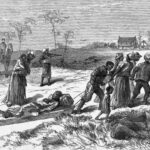This Day in History: 1875-04-01
 The United States Supreme Court finished hearing arguments in United States v. Cruikshank, a case that asked whether the federal government had the power to punish white men convicted of slaughtering dozens of Black people in Louisiana. Two years earlier, on Easter Sunday, April 13, 1873, hundreds of white men clashed with formerly enslaved Black men at the Grant Parish courthouse in Colfax, Louisiana. It is estimated that nearly 150 Black people died in the ensuing Coalfax Massacre – many murdered in cold blood after surrendering. Only three white men died. After the massacre, the federal government indicted over 100 members of the white mob under the Enforcement Act of 1870, a law was specifically enacted during Reconstruction to protect newly freed Black voters from the Ku Klux Klan and other white supremacist terrorists. Only three members of the mob were convicted, and they appealed. Nearly one year after hearing arguments, the Supreme Court issued a ruling reversing the criminal convictions of the three white men and holding that that the Bill of Rights did not apply to private actors or to state governments despite the adoption of the Fourteenth Amendment. The Cruikshank decision severely limited the federal government’s authority to legally enforce Black civil rights and protect Black citizens from racial terror at the hands of mobs intent on enhancing white racial dominance. Learn more.
The United States Supreme Court finished hearing arguments in United States v. Cruikshank, a case that asked whether the federal government had the power to punish white men convicted of slaughtering dozens of Black people in Louisiana. Two years earlier, on Easter Sunday, April 13, 1873, hundreds of white men clashed with formerly enslaved Black men at the Grant Parish courthouse in Colfax, Louisiana. It is estimated that nearly 150 Black people died in the ensuing Coalfax Massacre – many murdered in cold blood after surrendering. Only three white men died. After the massacre, the federal government indicted over 100 members of the white mob under the Enforcement Act of 1870, a law was specifically enacted during Reconstruction to protect newly freed Black voters from the Ku Klux Klan and other white supremacist terrorists. Only three members of the mob were convicted, and they appealed. Nearly one year after hearing arguments, the Supreme Court issued a ruling reversing the criminal convictions of the three white men and holding that that the Bill of Rights did not apply to private actors or to state governments despite the adoption of the Fourteenth Amendment. The Cruikshank decision severely limited the federal government’s authority to legally enforce Black civil rights and protect Black citizens from racial terror at the hands of mobs intent on enhancing white racial dominance. Learn more.
